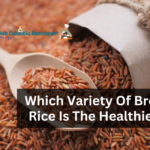There is no meal more important than breakfast when it comes to getting your day started off on the right foot.
It is not enough to simply satiate your hunger; you must also supply your body with the fuel and nutrients it requires to face the challenges ahead.
In this article, we’ll look at several delectable and wholesome breakfast options. We have options for your morning meal that range from tried-and-true classics to fresh takes on old favorites.
Good Healthy Things To Eat For Breakfast
Here is the list of good healthy things to eat for breakfast:
1. Cup Whole Grains
Antioxidants included in whole grains protect your tissues from damaging inflammation.
They’re also high in minerals like calcium, potassium, magnesium, zinc, and iron, which are necessary building blocks for a healthy immune system and heart.
Whole grains contain B vitamins, which help your body turn food into energy.
As a base layer for a breakfast bowl, you can use anything from quinoa to farro, buckwheat groats to millet, and then stack it with savory components or sweet additions.
Yes, bread can be part of a healthy breakfast: Choose a loaf that is made entirely of whole grains or whole wheat.
2. Shakes With Protein
Protein smoothies are more than simply a quick way to get protein. They’re also an excellent way to include vegetables in your breakfast.
Add two large handfuls of spinach, unsweetened almond milk, high-fiber fruits like berries, and a dash of cinnamon to your drinks in addition to protein powder.
When selecting a protein powder, seek for one that is a complete protein and has been confirmed by a third party.
It’s also a good clue if you see phrases like organic, grass-fed, wild, or non-GMO on the label.
Overall, the fewer the ingredients, the better. Avoid the use of added sweeteners, fillers, and stabilizers.
3. Eggs
Eggs are often eaten for breakfast for a number of reasons. They are cheap, high in vitamins A, D, and B12, and full of nutrients.
Two big eggs also give you more than half of the choline you need every day, and one egg has about 8 grams of protein.
Protein is important for the health of almost every part in our bodies, like our skin, blood, muscles, and bones.
Protein also takes longer to break down than carbs, so you feel fuller for longer. And GH nutritionists like Eggland’s Best Cage-Free.
Eggs have six times as much vitamin D and ten times as much vitamin E as other foods.
For a breakfast that is high in fiber and protein, make scrambled eggs on whole-grain bread with sliced tomato or a spinach-broccoli-mushroom omelet.
4. Oats
For a variety of reasons, oats are one of the best breakfast foods. They’re high in fiber, plant-based protein, B vitamins, and minerals like iron, calcium, and magnesium because they’re made entirely of whole grains.
Eating whole oats has been associated to a lower risk of heart disease due to a form of fiber known as “beta-glucan” that has been shown in studies to improve cholesterol levels.
A “prebiotic” plant fiber feeds your body’s probiotics, allowing friendly bacteria in your digestive system to survive and thrive.
5. Spinach
Spinach is a great breakfast option, whether it’s in an omelet, grain bowl, or smoothie.
This is because spinach contains chemicals that improve heart health by dilating arteries and lowering cholesterol.
Furthermore, the nitrates in spinach can help keep blood sugar levels low, which is very essential for diabetics.
In addition, spinach provides a variety of vital vitamins. In fact, a half-cup of frozen spinach contains 64% of the daily required amount of vitamin A.
6. Breakfast Bowl With Lentils
Though lentils may not appear to be a typical breakfast item, they may form an excellent base for a savory breakfast.
Lentils are high in plant-based protein as well as vitamins, minerals, and antioxidants.
They’re also highly versatile, simple to prepare, and a healthy and filling option to get you through till lunch.
7. Breakfast Bowl With Quinoa
Quinoa might be a terrific substitute for oats when you want to change things up. Quinoa isn’t simply for lunch or dinner.
It is high in fiber, iron, and protein, and it helps you feel filled for longer. Quinoa is a versatile grain that may be seasoned with ginger, vanilla, cinnamon, or other spices.
Pairing quinoa with citrus or berries, which contain vitamin C and help iron absorption. Top with a dollop of your favorite nut butter or some chopped nuts or seeds for extra protein and healthy fat.
Make it into a savory bowl by adding some sautéed greens and an egg. You’ll feel like you’re eating dessert for breakfast with our Pumpkin Oatmeal.
8. Greek Yoghurt
For a quick breakfast, Greek yogurt is a great pick. It is created by filtering whey and other liquids from milk curds, resulting in a creamy product that is higher in protein than conventional yogurt.
It also contains less calories than many other protein sources. A 1-cup (245-gram) portion of protein has 25 grams yet just 149 calories.
Certain varieties contain probiotics that aid digestion, such as Bifidobacteria. Look for the words “contains live and active cultures” on the label to confirm your yogurt contains probiotics.
Icelandic yogurt is another excellent choice if you like a creamier, higher-protein product.
Consuming Greek yogurt with berries and other fruits may enhance its prebiotic and probiotic benefits.
Texture, fiber, and other nutrients can be added by topping with dried fruit, oats, or nuts.
9. Coffee
Caffeine is a chemical found in coffee that enhances alertness, boosts mood, and improves physical and mental performance.
It may also contain a variety of polyphenols, which are antioxidant and anti-inflammatory chemicals.
Studies show that most adults can easily drink up to 3 cups (710 ml) of coffee or 400 milligrams of caffeine each day.
During pregnancy, you shouldn’t have more than 200 mg of caffeine per day because it may make problems more likely.
Coffee can be consumed black or with dairy or plant-based milk. Sugar should be avoided or used carefully, as it has been associated to health hazards.
10. Chia Seeds
Chia seeds provide a lot of fiber. One ounce (28 grams) of dry chia seeds has nearly 10 g of fiber.
This fiber is also soluble, which means it absorbs water and increases the volume of food passing through your digestive track, keeping you satisfied for longer.
Among other things, the nutrients in chia seeds may help control glucose levels, decrease cholesterol, and avoid inflammation.
Chia seeds aren’t particularly dense in protein, but combining them with Greek yogurt, cottage cheese, or a protein drink can help you get more.
Adding a healthy breakfast to your daily routine is a small change that can make a big difference in your health and general well-being. There are healthy breakfast options for everyone, whether you like classic dishes, foreign flavors, or quick options for when you’re in a hurry in the morning.
Thanks for reading. I hope you find it helpful.










